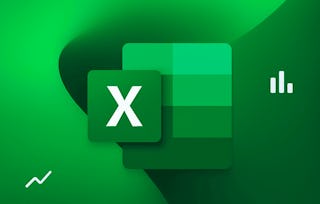"Everyday Excel, Part 2" is a continuation of the popular "Everyday Excel, Part 1". Building on concepts learned in the first course, you will continue to expand your knowledge of applications in Excel. This course is aimed at intermediate users, but even advanced users will pick up new skills and tools in Excel. By the end of this course, you will have the skills and tools to take on the project-based "Everyday Excel, Part 3 (Projects)".

Everyday Excel, Part 2
Seize the savings! Get 40% off 3 months of Coursera Plus and full access to thousands of courses.

Everyday Excel, Part 2
This course is part of Everyday Excel Specialization

Instructor: Charlie Nuttelman
53,295 already enrolled
Included with
571 reviews
Recommended experience
What you'll learn
Advanced data management techniques
How to implement financial calculations in Excel
How to use advanced tools in Excel (Data Tables, Goal Seek, and Solver) to perform and solve "what-if" analyses
How to create mathematical predictive regression models using the Regression tool in Excel
Skills you'll gain
Tools you'll learn
Details to know

Add to your LinkedIn profile
11 assignments
See how employees at top companies are mastering in-demand skills

Build your subject-matter expertise
- Learn new concepts from industry experts
- Gain a foundational understanding of a subject or tool
- Develop job-relevant skills with hands-on projects
- Earn a shareable career certificate

There are 5 modules in this course
In Week 1 you will learn all about advanced data management strategies in Excel. These techniques include two-way look-ups, two-way conditional look-ups, how to find the maximum or minimum location in an array, conditional drop-down lists, advanced conditional formatting strategies, how to compare lists (for unique, duplicates, and absent items), advanced duplicate management, and how to work with expiry dates. Week 1 will conclude with a required quiz and an on-computer, in-application assignment. When you successfully complete Assignment 1, you will be given a "completion code", which you can input into the Assignment 1 submission quiz to earn credit for the assignment. For paid learners, the Week 2 Excel files will be released when you have successfully passed Quiz 1 and Assignment 1. Good luck!
What's included
17 videos11 readings3 assignments2 discussion prompts
In Weeks 2 and 3 you will learn all about advanced financial functions and applications in Excel. In Week 2, you will first learn about the concepts of and how to implement Excel formulas for the time value of money, simple and compound interest, and various loans (amortized, interest-only, and line of credit loans). You will learn how to create amortization schedules in Excel for these loans. Week 2 concludes with a required quiz and an on-computer, in-application assignment. When you successfully complete Assignment 2, you will be given a "completion code", which you can input into the Assignment 2 submission quiz to earn credit for the assignment. For paid learners, the Week 3 Excel files will be released when you have successfully passed Quiz 3 and Assignment 3. Good luck!
What's included
13 videos4 readings2 assignments1 discussion prompt
In Week 3, you will continue learning about advanced financial features of Excel. First, you will learn about depreciation and how to calculate depreciation and implement depreciation schedules in Excel. Next, you will learn about cash flows and net present value, and how to implement Excel functions to analyze cash flows. Then, you will learn how to compare financial alternatives. Finally, you'll learn about internal rate of return (IRR) and how to implement the IRR function in Excel. The week concludes with Quiz 3 and Assignment 3. When you successfully complete Assignment 3, you will be given a "completion code", which you can input into the Assignment 3 submission quiz to earn credit for the assignment. For paid learners, the Week 4 Excel files will be released when you have successfully passed Quiz 3 and Assignment 3. Good luck!
What's included
10 videos4 readings2 assignments1 discussion prompt
One of the most valuable aspects of Excel is that it can be used nicely for case studies and "what-if" analyses. In Week 4, you'll learn about case studies, one-way and two-way data tables, and how to use the Goal Seek and Solver tools for targeting calculations. You'll also learn to use the Solver tool for optimization problems and problems for which you have constraints. The week concludes with Quiz 4 and Assignment 4. When you successfully complete Assignment 4, you will be given a "completion code", which you can input into the Assignment 4 submission quiz to earn credit for the assignment. For paid learners, the Week 5 Excel files will be released when you have successfully passed Quiz 4 and Assignment 4. Good luck!
What's included
12 videos4 readings2 assignments1 discussion prompt
Week 5 of the course is all about creating mathematical models for experimental data. In this week, you'll first learn about how to insert trendlines into Excel plots and how to linearly interpolate between data points. Next, you'll learn about simple linear regression, general linear regression, and multilinear regression models and how to use Excel's Regression tool to create these regression models. The week concludes with an introduction to the logistic regression model, which is a type of nonlinear regression model. The week concludes with Quiz 5 and Assignment 5. When you successfully complete Assignment 5, you will be given a "completion code", which you can input into the Assignment 5 submission quiz to earn credit for the assignment. Then, you can pat yourself on the back for completing "Everyday Excel, Part 2!"
What's included
10 videos4 readings2 assignments1 discussion prompt
Earn a career certificate
Add this credential to your LinkedIn profile, resume, or CV. Share it on social media and in your performance review.
Instructor

Offered by
Explore more from Design and Product
 Status: Free Trial
Status: Free TrialUniversity of Colorado Boulder
 Status: Free Trial
Status: Free TrialUniversity of Colorado Boulder
 Status: Free Trial
Status: Free TrialUniversity of Colorado Boulder
 Status: Free Trial
Status: Free TrialUniversity of Colorado Boulder
Why people choose Coursera for their career

Felipe M.

Jennifer J.

Larry W.

Chaitanya A.
Learner reviews
- 5 stars
84.06%
- 4 stars
11.20%
- 3 stars
2.27%
- 2 stars
0.17%
- 1 star
2.27%
Showing 3 of 571
Reviewed on Aug 14, 2020
Charlie is an AMAZING instructor - I learned a lot, and I wouldn't have if it weren't for his teaching style!
Reviewed on May 17, 2023
It's the best course for Excel and for beginners and I really enjoyed learning this whole and it was a great experience.
Reviewed on Jun 22, 2020
It is Very Clearly explained! very good examples and exercises! Also learn how to solve problems not only how to use the excel as a tool.

Open new doors with Coursera Plus
Unlimited access to 10,000+ world-class courses, hands-on projects, and job-ready certificate programs - all included in your subscription
Advance your career with an online degree
Earn a degree from world-class universities - 100% online
Join over 3,400 global companies that choose Coursera for Business
Upskill your employees to excel in the digital economy
Frequently asked questions
To access the course materials, assignments and to earn a Certificate, you will need to purchase the Certificate experience when you enroll in a course. You can try a Free Trial instead, or apply for Financial Aid. The course may offer 'Full Course, No Certificate' instead. This option lets you see all course materials, submit required assessments, and get a final grade. This also means that you will not be able to purchase a Certificate experience.
When you enroll in the course, you get access to all of the courses in the Specialization, and you earn a certificate when you complete the work. Your electronic Certificate will be added to your Accomplishments page - from there, you can print your Certificate or add it to your LinkedIn profile.
Yes. In select learning programs, you can apply for financial aid or a scholarship if you can’t afford the enrollment fee. If fin aid or scholarship is available for your learning program selection, you’ll find a link to apply on the description page.
More questions
Financial aid available,

